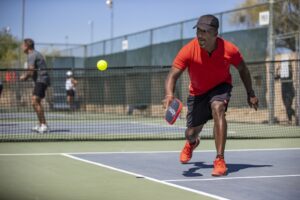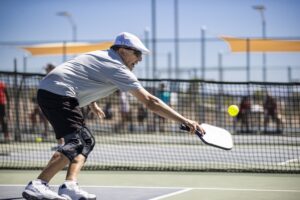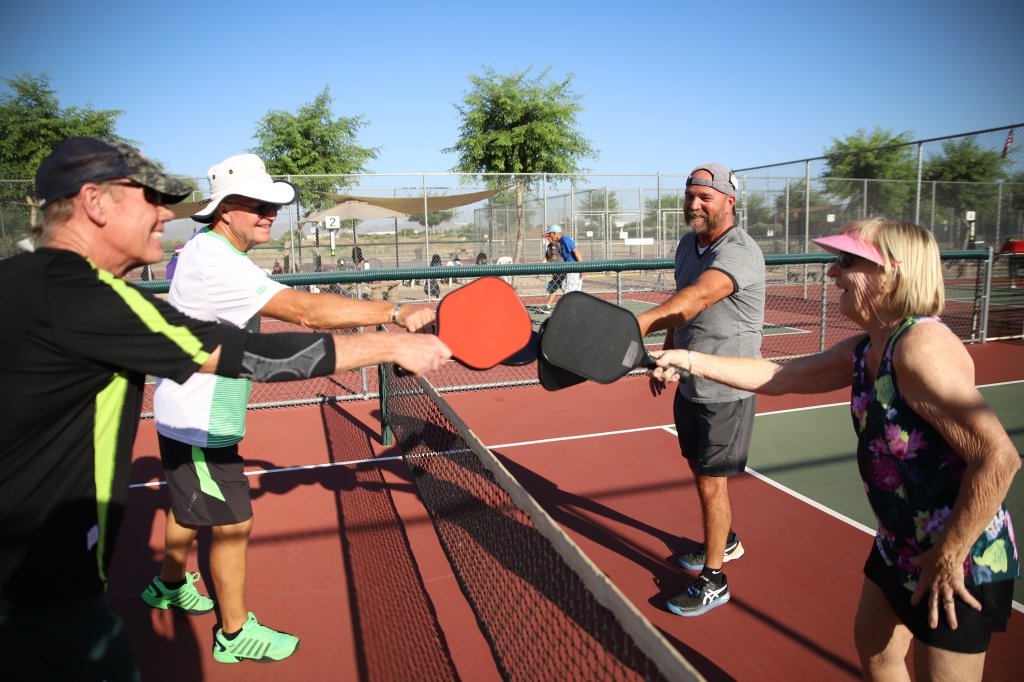Writer Shannon Severson // Photography Courtesy of Pickleball is Great



Move over, hot potato! There’s a new(ish) game in town with a vegetable-derived moniker: pickleball. It’s a sport with a funny name, but a massive, growing popularity that draws from all age groups and generations.
According to USA Pickleball, the number of pickleball participants grew 159% to 8.9 million in the three years between 2019 and 2022 and it is estimated that more than 36.5 million people participated in the sport over those years. For comparison, the sport of tennis grew just 33% in the same time span.
Here in Arizona, pickleball is experiencing a similar surge in popularity that is spurring an entrepreneurial boom to serve picklers, both casual and uber-competitive. Professional athletes, including the Phoenix Suns’ Kevin Durant, Super Bowl quarterback Patrick Mahomes, Tom Brady and LeBron James, not only play themselves but have invested in professional teams.
“Pickleball has been exploding across the country in recent years as the fastest-growing sport in America, but Arizona certainly stands out as one of the meccas of the sport,” explains Melissa Zhang, director of communications and content for USA Pickleball, the national governing body of the sport headquartered in Arizona.



The Sweet Spot
Pickleball is a racket sport that could best be described as a mix of tennis, badminton and table tennis. It is played with a perforated plastic ball and a specific type of paddle that’s smaller than a tennis racket but larger than a table tennis paddle. It’s played on a rectangular court that is considerably smaller than a tennis court but has a similar appearance.
Originally invented in 1965 by a trio of Bainbridge Island, Washington, fathers looking to entertain their bored children, the sport can be played by singles or doubles and games are played to 11 points but must be won by two points. The rules are fairly simple, and because of the small court size, it’s great for people of all athletic abilities — though the fleet of foot will definitely have an advantage.
The USA Pickleball website has videos about how to play, official rules, links to find local courts and tournaments, club information and merchandise links. Apparel and equipment are big business for manufacturers who develop shoes, eyewear and clothing especially for pickleball participants. However, the entry costs to get started in the sport are quite affordable, and many schools and community centers have public courts.
The approachability and slower-moving pace of pickleball make it great for beginners and for intergenerational playing opportunities. It’s also known for being a social game, and many communities and friendships are built around it.
For the casual or competitive “pickler,” businesses are popping up all over the Valley to facilitate play, and those with indoor courts are especially popular.
In the Glendale area, Chicken N Pickle is a restaurant with indoor and outdoor courts in the Westgate Entertainment District, and The Pickleball Space offers lessons, drop-in play, leagues, events and a membership option.
PickleMall, with its first indoor facility inside Arizona Mills mall in Tempe, is a business that reimagines the use of large shopping malls with underutilized space. An app is used to book court time, and cameras are always rolling so players can review game footage, track their performance and find ways to improve.
For free public access, the city of Phoenix has 24 indoor and 44 outdoor courts around the Valley.
The other end of the spectrum is the private club model and that’s coming, too. Center Court Pickleball Club will soon open members-only locations in Scottsdale, Glendale and Gilbert, with varying membership levels for individuals, friends and family. Each of the locations have 10 full-size, individually fenced indoor pickleball courts in a climate-controlled environment. The usual club amenities will be offered, including locker rooms, showers, a wellness space, food and drink options, certified pickleball pros and a retail shop.



Have Paddle, Will Travel
One of the most popular ways to get involved in the sport of pickleball and its community is to participate in tournaments.
Formerly from Hawaii and now living in Phoenix, entrepreneur Mike Hoxie is the founder of Pickleball Is Great, a tournament management company. His business, which began as a side job in 2016 while he was living in the Pacific Northwest, has grown exponentially and he now employs five active tournament directors, with four more in the pipeline.
“Things really started to happen in 2018,” Hoxie recalls. “I ran out of vacation time and left my job. My son agreed to give up the extras like vacations so that I could start it as an S corporation. That first year, I hired more tournament directors and we did 46 tournaments.”
The COVID-19 pandemic put a damper on things in 2020, but it presented the opportunity for Pickleball Is Great to expand into warm-weather states with fewer gathering restrictions, including Utah, Arizona, Texas and South Carolina. Business roared back in 2021 with 68 tournaments, and his success continued apace. In 2023, his company operated 91 tournaments in 12 states. The number of participants can vary from as few as 50 to as many as 1,500.
As Pickleball Is Great expands, the goal is for each director to administer 20 tournaments per year in their region, with Hoxie heading one home tournament and one on the road each month. He’s traveling much more than that now, but it’s the “cost” of being known for excellence.
“We run a tight ship,” Hoxie says. “Most tournaments are a mess. People know we are going to make sure they get their money’s worth and plenty of playing time. They say, ‘When you want to run a tournament right, call Mike.’”
Round robin tournaments are Hoxie’s bread and butter; he says they give players more games for their money and it’s what he recommends for players just getting started in the tournament scene. The events usually last four days. Players start out by self-rating their level and get feedback along the way. He also divides players by age; “seniors” includes anyone over the age of 50, and they generally play for the first two days of the tournament on weekdays. Younger players are scheduled on weekends, and seniors can certainly join their children, a younger sibling, niece or nephew.
“Organizing it like this grows both sides of the market,” Hoxie explains. “It’s very all-inclusive so everyone can play. We work with US Senior Pickleball and make sure seniors get to play seniors so it’s an even match. Dividing everyone this way is how I feel I can service the whole market and create a fair experience for everyone.”
The average tournament lasts three to four hours, and Hoxie makes it a point to give players ample notice about arrival times, what to bring and all the details they need to know.
“Round robins are more fun,” he says. “We do a playoff afterward to make sure the right people make it to the playoffs since ratings are not accurate. Some are double-elimination and are more competitive. If you lose twice, you go home, so you could be there [for] seven hours or less than an hour.”
Wherever he holds a tournament, Hoxie encourages participants to plan to attend one of his Hawaii tournaments. This June, the Hawaii Pacific Rim Pickleball Cup, termed “an international event of aloha,” will be on the Big Island of Hawaii.
“We start on time and end on time and then we get to do happy hour together,” Hoxie says. “Then people can get to the other activities they enjoy on the islands.”
There’s a family reunion aspect to many tournaments; picklers tend to combine pleasure travel or visiting relatives with pickleball tournaments being held in the area. Many long-term friendships are born of the camaraderie at these events.
Hoxie not only runs his own tournaments but is also hired by organizers and charities. For example, a Boys & Girls Club in Virginia has contracted with him to run a combination black-tie event and pickleball tournament — an effort for a good cause that will blend in competitive fun on the court.
His business’s good reputation has earned him contracts in 12 states to operate pickleball state championships in each.



Southwest Circuit
While Hoxie was no stranger to Arizona before relocating, he has enjoyed the deeper dive into the state’s pickleball community.
“During snowbird season, the Southwest market has players from all over the country,” Hoxie says. “It’s amazing to see the variety of player types. I’ve been to many parts of the state already and every time I run a tournament, there are more people from more areas who see what we do. People like that we keep them informed. I think that is why players tend to travel to wherever we are; they like the job we do.”
The proximity to Flagstaff, Prescott, Palm Springs, Las Vegas, Albuquerque and Tucson makes it easy for locals to travel to tournaments in less than a day.
This month, Pickleball is Great will hold events in Wickenburg, Mesa, Gilbert and, though not confirmed at press time, most likely Scottsdale and Prescott.
Arizona will also have the national spotlight later this year, as Zhang explains.
“With the recent announcement of pickleball’s national championships coming to Mesa this fall, the Valley of the Sun boasts a very strong presence in our sport,” Zhang says. “We expect to see continued expansion of pickleball in Arizona, from facilities to tournaments, over the months and years to come.”







Comments by Admin